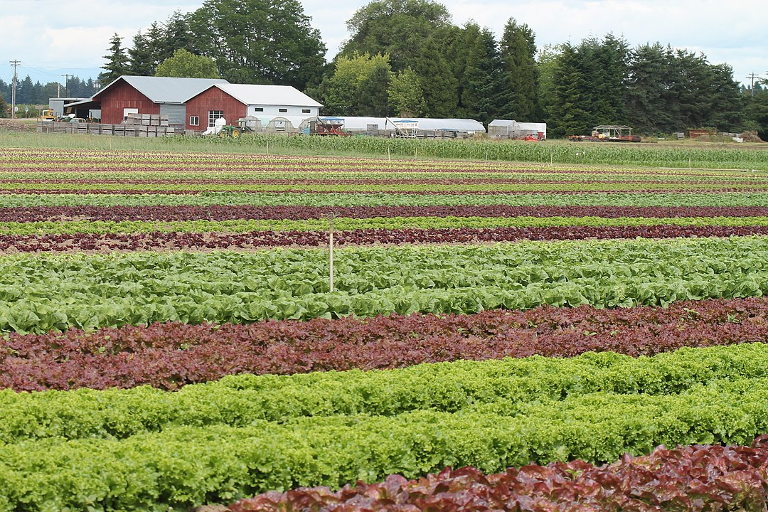The flaws of an industrialized food system have, yet again, been exposed—this time through a cyberattack. On May 30, 2021, a cyberattack caused JBS, the world’s largest meat processing plant, to close nine meat processing plants in the United States. Although the shutdown lasted for only a day, analysts report that even short stoppages impact meat prices. Disruptions like the cyberattack highlight the problems with an industrialized food system and the need for policies that support local food systems.
A more pronounced disruption occurred over a year ago when Covid outbreaks forced many meatpacking plants, food processing plants, and farms to close for several weeks and months. The Food and Environment Reporting Network reports that as of June 21, 2021, at least 91,140 workers have tested positive for Covid-19; at least 464 workers have died. In addition to these tragedies, the pandemic forced farmers to euthanize animals and dump milk because while production continued, meat and milk processing did not.
The meat industry, like other agricultural sectors, has become increasingly consolidated over the past four decades. Four giant companies, including JBS, control more than 80% of the U.S. beef supply. Poultry, pork, dairy, and field crop operations have experienced similar consolidation. The United States Department of Agriculture (USDA) reports that there were 2.02 million U.S. farms in 2020, down from 2.20 million in 2007, and 6.8 million farms in 1935, with the largest farms accounting for more than 70% of the cropland in the United States. The number of Black farmers has decreased to just under 50,000 in 2017 from its peak of 1 million in 1920.
Industrialized farming operations grew out of a need to accommodate these large-scale corporate processors. Bolstered by discriminatory USDA programs, monoculture farms and concentrated animal feeding operations (CAFOs) have displaced traditional farming operations. Prioritizing productivity and profits, these industrialized operations use techniques that harm farmworkers, impact public health, degrade the environment, and perpetuate inequality.
Weather-related disasters, like droughts, flooding, and freezes, which have become more frequent and intense due to climate change, used to be the only worry. Now, enterprises that are part of the industrialized food system must also contend with pandemics and cyberattacks.
No matter the cause of the disruption—climate, pandemic, cyberattack—the consequences are the same. Shortages occur, prices rise, and workers are harmed. To minimize the impact, the federal government often saves the day with huge bailouts, as was the case during the pandemic. An industrialized food system is costly in more ways than one.
In contrast, local food systems are diversified and nimble, making them much less susceptible to disruptions. Unlike corporate farms and processors, many local farming operations thrived during Covid. While some local farms, like those selling to restaurants, had to pivot, many found new outlets or grew existing ones. Empty shelves and safety concerns spurred consumer interest in local food businesses like farmers’ markets, CSAs, food hubs, independent meat processors, and pick-your-own operations. The pandemic revealed not only the resiliency of local food systems but also their necessity.
Unlike corporate directors, those involved with local food systems tend to be concerned with more than just the bottom line. While local food is premised on geography—the distance between agricultural producers and food consumers—local farming operations often use farming techniques that are regenerative and sustainable. These practices avoid pesticides, improve biodiversity, prevent soil erosion, retain soil health, reduce carbon footprints, and build community. Local food operations can provide better working conditions, prevent monopolies, and preserve open space. Additionally, local food operations infuse money into the local economy and provide opportunities to Black and Brown farmers and businesses.
Recognizing the benefits of local food, in May 2021, the USDA announced over $92.2 million in competitive grant funding under the Local Agriculture Market Program (LAMP). A Farm Bill program, LAMP has a history of generating new income sources for small, beginning, veteran, and socially disadvantaged farmers.
After the JBS cyberattack, former director of the U.S. Cybersecurity and Infrastructure Security Agency, Christopher Krebs, warned that “everyone is in play.” But the damage can be diminished when you don’t have all your eggs in one basket.
Rather than propping up an expensive, vulnerable, and consolidated industrialized food system, American tax dollars would be better spent growing programs like LAMP and aiding the transition to a food system that is sustainable, resilient, and local.
Teaser photo credit: https://en.wikipedia.org/wiki/Community-supported_agriculture#/media/File:Mustard_Seed_Farms_Oregon_CSA.jpg





